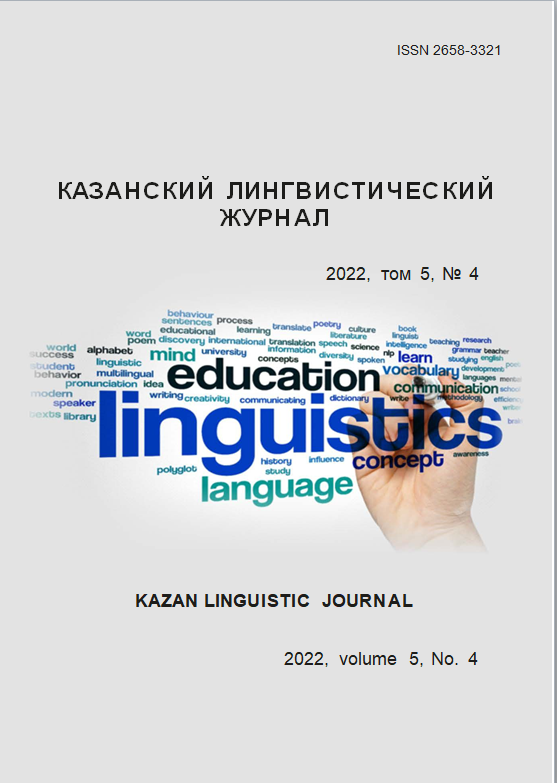The Complement of State (情态补语) as a Syntactical Category of Modern Chinese: Linguodidactic Aspect
https://doi.org/10.26907/2658-3321.2022.5.4.498-511
Keywords:
Chinese grammar, complement of state, adverbial modifier, grammatical interference, teaching ChineseAbstract
Mastering the skills of constructing utterances in Chinese using the syntactic category 补语 (complement) is traditionally fraught with a number of difficulties. The absence of an analogue in the grammatical system of the Russian language, the lack of agreement about terminology and the lack of unified approach to the teaching of Chinese grammar among Russian teachers lead to only partial familiarization of this grammatical material by students. The article discusses one of the types of complements – the complement of state (情态补语), its place in the system of Chinese complements, its functions and means of expression. The article focuses on the functional differences between the complement of state and adverbial modifier, the misunderstanding of which leads to grammatical interference (the transfer of grammatical features from Russian language to Chinese), that is one of the main reasons for the incorrect using of these members of the Chinese sentence by Russian students. It emphasizes the necessity to pay attention in the learning process not only to the formal structure of the sentence with the complement of state, but also to the purpose and the nature of the statement, its semantic accents, and the semantics of the verb.
References
References
Li Jinxi. A New Grammar of the Chinese National Language. Beijing: Shangwu yinshu-guan; 2001 (1924). (In Chin.)
Ding Shengshu. Lectures on modern Chinese grammar. Beijing: Shangwu yinshuguan; 1979. (In Chin.)
Zhang Zhigong. Grammar and the Pedagogy of Grammar: Introducing the “Proposal for a System of Teaching Chinese Grammar”. Beijing: Renmin jiaoyu chubanshe; 1956. (In Chin.)
Shao Jing, Jin Lixin. Buyu and Complement. Foreign Language Teaching and Research. 2011; 43(1):48−57. (In Chin.)
Zhao Yuanren. A Grammar of Spoken Chinese. Beijing: Shangwu yinshuguan; 1979. (In Chin.)
Huang Borong, Liao Xudong zhu bian. Modern Chinese. Lanzhou: Gansu renmin chu-banshe; 1981. (In Chin.)
Zhu Dexi. Lectures on grammar. Beijing: Shangwu yinshuguan; 1982. (In Chin.)
Liu Yuehua, Pan Wenyu, Gu Weihua zhu. Practical Grammar of Modern Chinese. Bei-jing: Waiyu jiaoxue yu yanjiu chuban she; 1983. (In Chin.)
Huang Borong, Liao Xudong zhu bian. Modern Chinese. Vol. 2. Beijing: Gaodeng jiaoyu chubanshe; 2007. (In Chin.)
Liu Yuehua, Pan Wenyu, Gu Weihua zhu. Practical Grammar of Modern Chinese. Re-vised and enlarged edition. Beijing: Shangwu yinshuguan; 2001 (2014 reprint). (In Chin.)
Hu Yushu. Modern Chinese. Shanghai: Shanghai jiaoyu chubanshe; 1987. (In Chin.)
Zhang Bin. New Modern Chinese. Shanghai: Fudan daxue chuban she; 2004. (In Chin.)
Xing Yuyi. Chinese Grammar. Changchun: Dongbei Normal University Press; 1996. (In Chin.)
Yin Shaohua. On the difference between adverbial and state complement. Xinan minzu xueyuan xuebao (Zhexue shehui kexue ban). 2002; 23(2): 213–216. (In Chin.)






